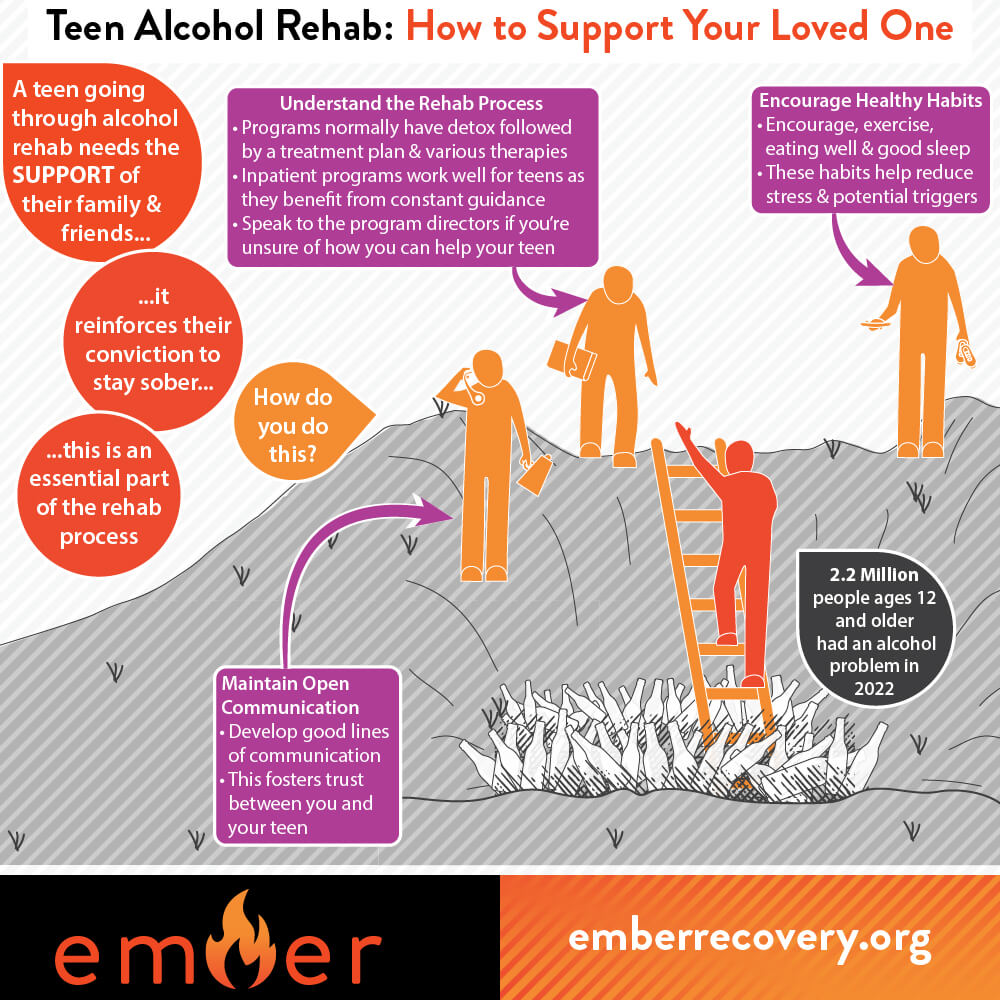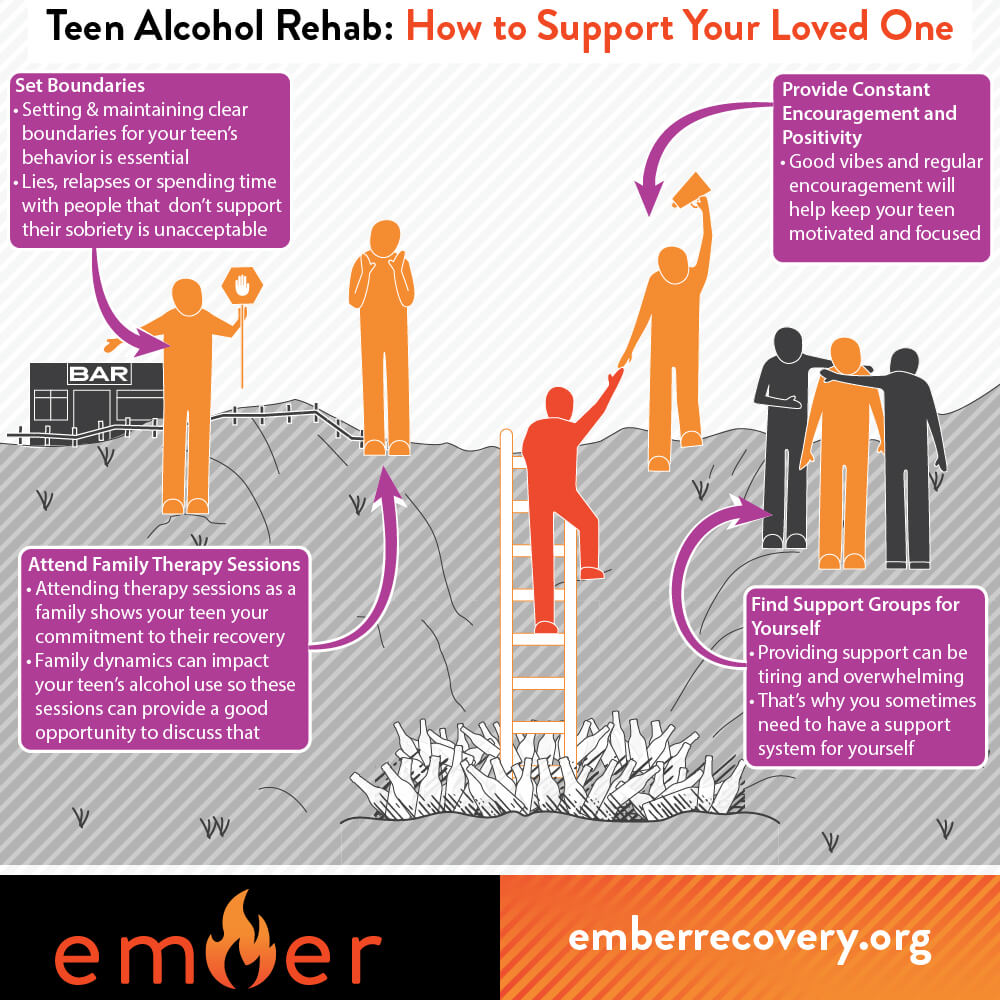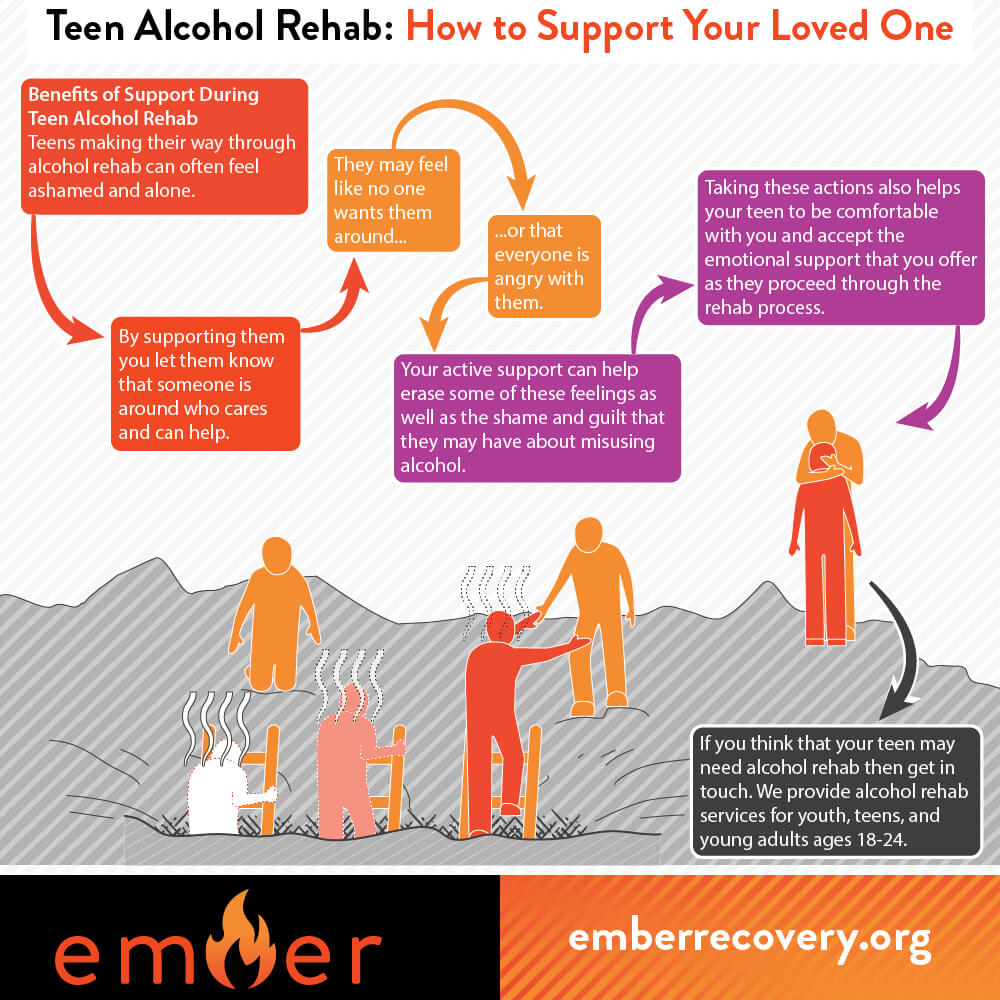As your teen is going through alcohol rehab, they will need as much support from family and friends as they can get. Support reassures them that they have people in their corner who want them to succeed in their sobriety and will stand by them every step of the way. We have provided several ways how you can support your loved one as they undergo teen alcohol rehab and why being supportive is an essential part of the process.
How to Support Your Teen Through Alcohol Rehab
Alcohol use disorders are common, with statistics showing that 2.2. million people ages 12 and older had one during 2022 alone.[1] If your teen is among those dealing with alcohol use, there are many different ways you can help them as they go through the rehab process.
Understand the Rehab Process
Family and friends must understand what happens when their loved one enters rehab. Teen alcohol rehab is a process that can involve detox as well as a dedicated treatment plan and various therapies. Many teens choose inpatient stays because they provide the constant guidance they need to reach sobriety.
To better understand the rehab process, loved ones can speak to treatment program directors to grasp what happens during rehab truly. They can ask questions and see how they can help in the process.
Encourage Healthy Habits
You can support your teen by encouraging healthy habits. Exercising, eating well, and getting enough sleep can all help to reduce stress. Studies show that some teens turn to alcohol and other substances to de-stress.[2] Whatever can be done to lower stress levels can decrease a teen’s likelihood of turning to alcohol.
Maintain Open Communication
Creating open lines of communication where your teen feels comfortable sharing their thoughts and emotions is vital. Your teen should feel like they have a non-judgmental environment where they can speak to you anytime. Actively listening to your teens and showing empathy will help build trust and encourage them to come to you if there is a problem.
Provide Constant Encouragement and Positivity
By providing constant encouragement, teens can stay motivated on their recovery goals. Being surrounded by positive vibes and support can allow teens to stay on the path to recovery as they work to overcome their alcohol use disorder.
Attend Family Therapy Sessions
Family therapy sessions can be beneficial because they show your teen that you want to be part of the process. Often, there are family issues that may have contributed to alcohol use. These can be discussed during therapy and worked on over time. Family therapy sessions can be beneficial during and after the rehab process.
Set Boundaries
Part of showing support during teen alcohol rehab is setting clear boundaries. While you are there to show support, they need to know that you won’t tolerate lies if they relapse or hide what’s happening. Being transparent is part of setting boundaries. Also, let them know that you will not condone them spending time around people who drink or have contributed to their alcohol use. Setting clear boundaries will let your teen know that while you stand behind them, there are rules that must be followed.
Find Support Groups for Yourself
While support groups and therapy are beneficial for teens, they are also helpful for loved ones. Supporting a teen during alcohol rehab can be overwhelming and stressful. Seeking support for yourself and maintaining self-care is essential if you want to continue to be the support system your loved one needs.
Benefits of Support During Teen Alcohol Rehab
When teens are going through alcohol rehab, they may feel ashamed and alone. By giving them the support they need, they can know that others are standing beside them, willing to help.
Lending support during teen alcohol rehab can also erase some of the shame and guilt that teens feel after misusing alcohol. They may think that no one wants to be around them or that everyone is angry. By supporting them, they can know that there is nothing to be ashamed of as they go through the rehab process. Providing support also gives teens the emotional support they need to push through the process and enjoy a sober life.
Seek Teen Alcohol Rehab at Ember Recovery
Ember Recovery provides teen alcohol rehab services for youth, teens, and young adults ages 18-24. Our residential programs provide a safe and nurturing environment where teens can learn how to overcome their alcohol use disorder and rebuild their lives. Surrounded by peers who are going through the same experiences, teens can find support as they navigate their path to sobriety.
Contact Ember Recovery today to learn more about our various programs to help your teen live a sober life.
Sources:
[1] https://www.niaaa.nih.gov/alcohols-effects-health/alcohol-topics/alcohol-facts-and-statistics/alcohol-treatment-united-states [2] https://www.cdc.gov/mmwr/volumes/73/wr/mm7305a1.htm?s_cid=mm7305a1_w

Andrea Dickerson is a Licensed Therapist and Certified Substance Use Counselor who has worked in behavioral health since 1997. Currently, Andrea is the Director of Behavioral Health, overseeing the Ember residential treatment programs and YSS outpatient counseling clinics throughout Central and North Central Iowa. She became a Motivational Interviewing (MI) trainer in 2006 and provides MI trainings throughout Iowa.
Andrea specializes in working with adolescents and their families and enjoys seeing the family relationships grow through therapy. Andrea is also a CARF International Surveyor, going around North America ensuring behavioral health organizations are meeting required standards.
In her free time, Andrea enjoys cheering on the Iowa Hawkeyes and Chicago Cubs, as well as being an active member of Soroptimist International of the Americas (SIA), a global organization that provides women and girls with access to the education and training they need to achieve economic empowerment. She has been a member of the SI of Des Moines club since 2012 and has been actively involved at the regional level, currently serving as Co-Governor of the Peaks to Plains Region.
Through her involvement in SIA, Andrea has been actively involved in the Dream Programs, coordinating annual Dream It, Be It: Career Support for Girls projects, which give girls the tools they need to achieve their education and career goals, empowering them to break cycles of poverty, violence, and abuse.



